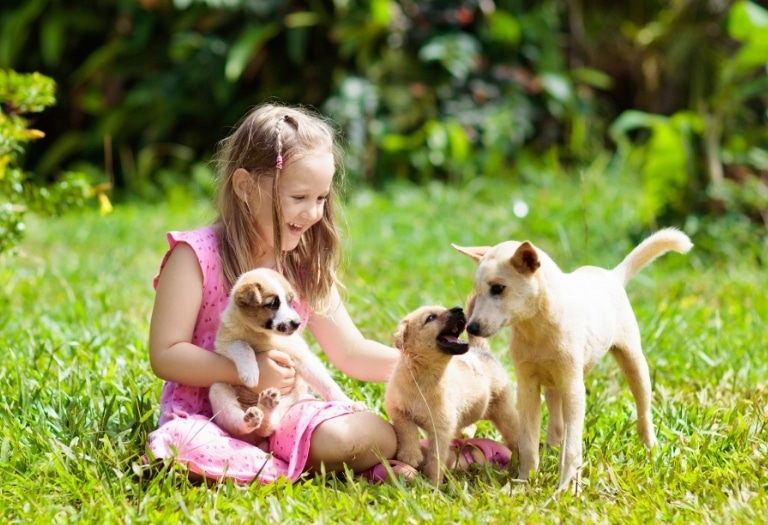Blog Puppy Socialization: Nine Easy Steps to Help Ensure a Well-Rounded Puppy
Once you bring a new puppy into your home, you need to be aware of his special needs. Dogs are social animals and they instinctively have the need to bond with their ‘pack’. Your puppy needs to learn how to respond to you, but also to other dogs. Here are some simple steps to help ensure a well-rounded puppy and that your puppy becomes a welcome member of the canine society and your home. Here are the 9 easy steps to help ensure a well-rounded puppy
Steps to Help Ensure a Well-Rounded Puppy:
- Touch your puppy. Puppies need to be handled. Rub their ears, massage their paws, get them used to being poked and prodded. By getting your puppy used to being touched, visits to the vet and groomer become easier. The more you do this the more likely your puppy will be accustomed to being touched, and will be less likely to resist.
- Pass your puppy. Your puppy should meet 100 people before he’s 6 months old. “Pass the Puppy” becomes a game. A new puppy is hard to resist, which is good for him. Let others hold him, pet him, touch his ears, the pads of his feet, etc. Remember that when you pass a puppy to someone, make sure that they are supporting your puppy and have a good hold on him before you let go. The last thing you want to do while socializing your puppy is drop him, which could be a traumatizing experience for the puppy and all!
- Feed your puppy. Your puppy needs to accept your presence around his food bowl. You can avoid future problems by not allowing your puppy to become protective of his food bowl. A dog that becomes protective of his food may become aggressive when approached. If your puppy does act protective, take it as a warning sign and seek professional help ASAP. Work to get him used to your presence while he is eating.
- Play with your puppy. Spend time with your puppy. Teach him games such as fetch and hide & seek. Take your puppy’s toys away from him. He needs to learn to accept that you can take his toys away. By doing so at an early age, you are helping your puppy to not become protective of his toys. If your puppy becomes aggressive when you take away his toys, your red flags should go up. Seek professional help: behavior like this will not go away on its own.
- Teach your puppy. Every puppy should know some basic commands. Sit, Down, Come, Drop it, and Leave it. Take a “puppy kindergarten” class as soon as you get your puppy. It’s a great place to start, and it should be a lot of fun for all. Do some research and ask around to find a reputable trainer.
- Roll your puppy. When playing with your puppy, roll him over onto his side. Hold him there for a few seconds and then let him go. If he struggles don’t let him go. You’re trying to teach him that physically he can’t over power you. When a dog is on his side, he is in a submissive position and in a very vulnerable. By placing your puppy in this position, he learns that you are the dominant member of his pack, and that he can trust you. He will learn that nothing bad will happen when he allows himself to be vulnerable to you. Make this a fun part of every day.
- Puppy play groups. Many people think that they need to shelter their puppy as you would a baby, which leads many dogs to grow up unable to socialize with other dogs. By getting your puppy into a “puppy playgroup” at an early age, he will learn how to interact with others. It’s never too soon for your new puppy to meet other puppies.
- Kids and puppies. Puppies need to learn how to behave around children. Children need to learn how to behave around puppies. Your puppy needs to learn that a toddler pulling his tail is allowed, and that snapping in response to a tug is not allowed. Children need to be taught not to pull puppies’ tails, or they may get snapped at. It’s a fine line, however there is a mutual respect that all puppies and kids need to learn early on. Never leave a child unattended with any dog at any time. It only takes a second for a disaster to happen.
- Your frightened puppy. Remember that puppies, like toddlers, are learning everything for the first time. The first time they hear a loud noise or something scares them, they will retreat and be afraid. Your first reaction is to smother them with ‘It’s ok’ and lots of attention. Don’t. Act like nothing happened. By drawing attention to his fright, he will grow to be afraid of everything. Let your puppy realize that the noise he heard wasn’t that big of a deal, and he will learn to recover from startling situations quickly.

